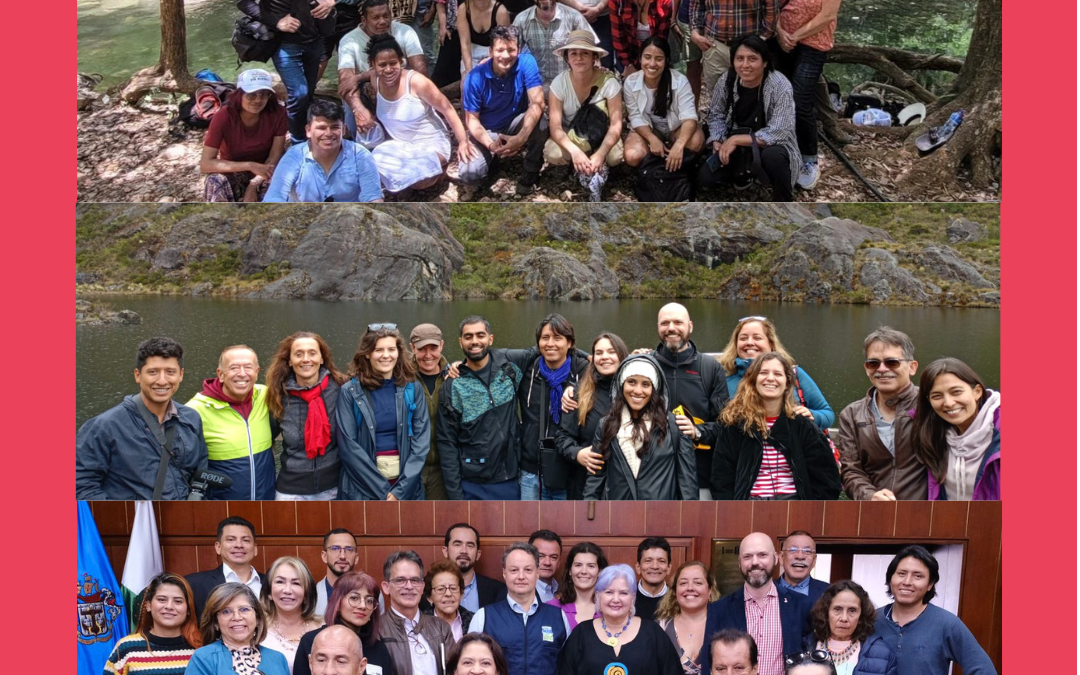Today, the International Mission to #StopISDS launches its final report, rejecting the abuse of power by transnational corporations who are suing Colombia for billions of dollars, and calling on Gustavo Petro’s administration to withdraw from this unfair system of foreign investment protection. The Mission, which includes representatives from social and environmental organisations from eight countries in Europe and the Americas, visited Colombia between 22 May and 1 June 2023, to share experiences of action against the Investor-State Dispute Settlement System (ISDS). This system allows transnational corporations to sue sovereign countries in secretive supranational arbitration tribunals.
In recent years, Colombia has been the target of attacks by transnational corporations, especially against the important achievements of struggles in defense of life and territories in the face of extractivist projects and against judicial decisions in favor of their human rights, water and health. This foreign investor protection system derives from the Free Trade Agreements (FTAs) and Bilateral Investment Treaties (BITs) signed by Colombia. Its main tribunal is the International Centre for Settlement of Investment Disputes (ICSID), part of the World Bank.
The mission visited La Guajira and Santander departments to learn about the impacts and threats posed by transnational mining companies in these territories. Then, together with participation from organisations from both territories, the mission participated in a public hearing in the Colombian Congress and met with authorities from six state agencies and civil society organisations in Bogota, with the aim of communicating the harmfulness of the system of foreign investment protection and showing that Colombia is not alone. The mission shared experiences from Europe, Ecuador, and other parts of the world where governments have been rejecting supranational arbitration tribunals.
According to the National Agency for Legal Defense of the State, as of March 2023, there were 14 open cases and 8 in the pre-arbitration stage, totalling USD$13.2 billion dollars) claimed by transnational corporations, although there are cases in which the amount claimed has not been published.
ISDS Claims Against Colombia – Google Sheets
The Mission’s report highlights how several of the lawsuits being brought in tribunals such as ICSID, in addition to the mere threat of more lawsuits, endanger sensitive peoples and ecosystems such as the Bruno stream in La Guajira and the Santurbán páramo. One of these lawsuits against Colombia was filed by the Swiss transnational Glencore, owner of Cerrejón, the largest open-pit coal mine in Latin America. The claim comes in response to the implementation of a Constitutional Court ruling in favor of the Wayúu people’s rights to water, health and food sovereignty. Another trio of lawsuits have been filed by Canadian gold mining transnationals Eco Oro Minerals, Red Eagle and Galway Gold, in response to environmental protection measures won following strong mobilization by the Committee for the Defense of Water and the Santurbán páramo. At the same time, there is serious concern about the possibility that Minesa—an Emirati mining company, in partnership with Canadian company Aris Mining—could resort to the same mechanism to undermine environmental measures necessary for the wholesale protection of the hydrographic basin that supplies the city of Bucaramanga and the surrounding region.
“We witnessed how this system enables corporate impunity and threatens the realization and defence of Colombians’ fundamental human and environmental rights. We also observed how this system interferes with judicial independence, environmental regulation, and national sovereignty,” the report said.
It also concluded that it is not enough for the State National Agency for Legal Defense of the State, the entity in charge of these lawsuits, to defend itself well or negotiate the price of compensation demanded by the companies. Nor would it be enough for the state to decide to modernise its BITs and FTAs, with adjustments to certain clauses that grant exclusive privileges to foreign investors.
“Renegotiating existing agreements, but leaving the ISDS mechanism within the treaties, even with reformed clauses, continues to give special preregotatives to foreign investors over the Colombian population and its companies,” states the report.
To this end, the International Mission, affected communities and the social organizations promoting this initiative have launched, in parallel with the Mission’s report, an online petition for the creation of a citizens auditing commission of FTAs and BITs. This petition is in line with an international declaration signed by almost 300 organizations worldwide, which the Mission presented in various spaces and meetings in Colombia, requesting the government to review investment agreements and trade treaties that contain ISDS, as well as to withdraw from ICSID and not to sign any further agreements that contain investment protection clauses.
Report-of-the-International-Mission-to-Colombia-August-2023Sign the petition here: https://sites.google.com/view/globalstatementcolombia/citizens-audit-commission

